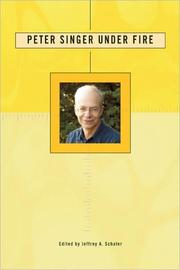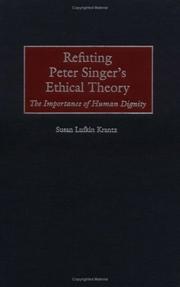| Listing 1 - 10 of 13 | << page >> |
Sort by
|

ISBN: 9780812696189 0812696182 Year: 2009 Volume: 3 Publisher: Chicago: Open Court,
Abstract | Keywords | Export | Availability | Bookmark
 Loading...
Loading...Choose an application
- Reference Manager
- EndNote
- RefWorks (Direct export to RefWorks)
Singer, Peter, --- Singer, Peter --- Singer, Peter Albert David --- Singer, Peter, - 1946 --- -Singer, Peter --- -Singer, Peter, - 1946-
Book
ISBN: 1536134074 9781536134070 9781536134063 Year: 2018 Publisher: New York : Nova Science Publishers,
Abstract | Keywords | Export | Availability | Bookmark
 Loading...
Loading...Choose an application
- Reference Manager
- EndNote
- RefWorks (Direct export to RefWorks)

ISBN: 155786909X 1557869081 9781557869098 Year: 2000 Volume: 8 Publisher: Oxford : Blackwell,
Abstract | Keywords | Export | Availability | Bookmark
 Loading...
Loading...Choose an application
- Reference Manager
- EndNote
- RefWorks (Direct export to RefWorks)
Social ethics --- Ethics, Modern --- Morale sociale --- Morale --- Singer, Peter, --- Ethics --- Criticism and interpretation --- Singer, Peter --- Ethics. --- Criticism and interpretation. --- Singer, Peter Albert David --- Singer, Peter, - 1946 --- -Social ethics --- -Singer, Peter --- -Singer, Peter, - 1946-

ISBN: 0275970833 0313010668 9780313010668 9780275970833 9798216006589 Year: 2002 Publisher: Westport, Conn. : London : Praeger, Bloomsbury Publishing,
Abstract | Keywords | Export | Availability | Bookmark
 Loading...
Loading...Choose an application
- Reference Manager
- EndNote
- RefWorks (Direct export to RefWorks)
This work shows how Singer's ethical theories threaten human values in a variety of ways. Krantz provides a defense of traditional, human-centered ethics against Peter Singer's ethical theory. Singer favors a "Copernican revolution" in ethics because he thinks our traditional ethics has collapsed under pressure from medical technology and from advances in the biological understanding of our fellow animals. For nearly thirty years he has argued that the boundaries of the human lifespan and of the human species are so unclear that we must abandon our views that human beings have a special dignity and that the taking of innocent human life is always wrong. Against this Krantz argues that in today's world, human life has been cheapened and the values of the marketplace have begun to govern medical care and organ donation, birth and death. In fact, this is just a foretaste of the world to come if Singer's ethical theory succeeds in replacing traditional human-centered ethics. What is required is, not the abandonment of human dignity and of the sanctity of human life, but rather a renewed understanding of how principles based on these ideas can be applied in the twenty-first century.
Singer, Peter, --- menswaardigheid (waardigheid) --- dignité humaine --- Singer, Peter --- Singer, Peter Albert David --- Ethics. --- Deontology --- Ethics, Primitive --- Ethology --- Moral philosophy --- Morality --- Morals --- Philosophy, Moral --- Science, Moral --- Philosophy --- Values --- Singer, Peter, - 1946 --- -Ethics. --- -menswaardigheid (waardigheid) --- -Singer, Peter, - 1946 --- -Singer, Peter,
Book
ISBN: 9781139379281 1139379283 9781139376426 113937642X 1139374990 9781139374996 9781139043304 1139043307 9780521199155 0521199158 9780521149334 0521149339 1107223865 1139365363 1280663804 9786613640734 113937785X 1139371002 9781107223868 9781139365369 9781280663802 6613640735 9781139371001 Year: 2012 Publisher: Cambridge Cambridge University Press
Abstract | Keywords | Export | Availability | Bookmark
 Loading...
Loading...Choose an application
- Reference Manager
- EndNote
- RefWorks (Direct export to RefWorks)
Interaction between Peter Singer and Christian ethics, to the extent that it has happened at all, has been unproductive and often antagonistic. Singer sees himself as leading a 'Copernican Revolution' against a sanctity of life ethic, while many Christians associate his work with a 'culture of death'. Charles Camosy shows that this polarized understanding of the two positions is a mistake. While their conclusions about abortion and euthanasia may differ, there is surprising overlap in Christian and Singerite arguments, and disagreements are interesting and fruitful. Furthermore, it turns out that Christians and Singerites can even make common cause, for instance in matters such as global poverty and the dignity of non-human animals. Peter Singer and Christian ethics are far closer than almost anyone has imagined, and this book is valuable to those who are interested in fresh thinking about the relationship between religious and secular ethics.
Christian ethics --- 1 SINGER, PETER --- 241:1 --- 241.63 --- Ethical theology --- Moral theology --- Theology, Ethical --- Theology, Moral --- Christian life --- Christian philosophy --- Religious ethics --- 241.63 Theologische ethiek: eerbied voor het leven en de waardigheid van de menselijke persoon --- Theologische ethiek: eerbied voor het leven en de waardigheid van de menselijke persoon --- 1 SINGER, PETER Filosofie. Psychologie--SINGER, PETER --- Filosofie. Psychologie--SINGER, PETER --- Moraaltheologie. Theologische ethiek-:-Filosofie. Psychologie --- Singer, Peter, --- Singer, Peter Albert David --- Christian ethics. --- Arts and Humanities --- Philosophy
Book
ISSN: 18621147 ISBN: 128385659X 3110255650 9783110255652 9781283856591 9783110255645 3110255642 Year: 2012 Publisher: Berlin ; Boston : De Gruyter,
Abstract | Keywords | Export | Availability | Bookmark
 Loading...
Loading...Choose an application
- Reference Manager
- EndNote
- RefWorks (Direct export to RefWorks)
Are there strong positive obligations? We obviously consider it a strong obligation to save a drowning child. The first part of this work investigates the factors that define the strength of such an obligation to help and how this is to be differentiated from actions that transcend obligation and from charitable obligations. The second part examines the question whether this case can be transposed to our relationship with those suffering from poverty and cites morally relevant factors that differentiate the cases.
Responsibility. --- Supererogation. --- Poverty --- Moral and ethical aspects. --- Global Poverty. --- Justice. --- Positive Duties. --- Singer, Peter.
Book
ISBN: 3631343426 Year: 1999 Publisher: Frankfurt am Main Lang
Abstract | Keywords | Export | Availability | Bookmark
 Loading...
Loading...Choose an application
- Reference Manager
- EndNote
- RefWorks (Direct export to RefWorks)
Attention --- Respect --- History --- Kant, Immanuel --- Singer, Peter --- Tugendhat, Ernst --- Wolf, Ursula, --- Ethics.
Book
ISBN: 3495478795 Year: 1999 Publisher: Freiburg Alber
Abstract | Keywords | Export | Availability | Bookmark
 Loading...
Loading...Choose an application
- Reference Manager
- EndNote
- RefWorks (Direct export to RefWorks)
Animal rights --- Ethics --- Moral and ethical aspects --- Regan, Tom. --- Salt, Henry Stephens, --- Singer, Peter
Book
ISSN: 19513321 ISBN: 9782753552555 275355255X Year: 2017 Publisher: Rennes: Presses universitaires de Rennes,
Abstract | Keywords | Export | Availability | Bookmark
 Loading...
Loading...Choose an application
- Reference Manager
- EndNote
- RefWorks (Direct export to RefWorks)
Dans son ouvrage La libération animale, Peter Singer développe trois grandes idées : le principe d'égale considération des intérêts, le rejet du spécisme et la nécessité de mettre un terme à certains types d'exploitation des animaux, notamment ceux qui ont trait à la recherche et à l'élevage industriel. Cette oeuvre phare a connu un retentissement immense, à tel point que sa publication, en 1975, a été présentée comme le moment clef dans l'émergence du mouvement éponyme. Cependant, le mouvement de libération animale ne saurait se réduire à la seule pensée singerienne. Ce mouvement extrêmement protéiforme a fait l'objet de débats intenses à l'interne, entre les défenseurs des animaux eux-mêmes qui privilégient des approches diverses, comme à l'externe, entre ceux qui défendent le statu quo ou contestent les arguments animalistes. L'objet de ce recueil est de revenir sur le lien entre le mouvement de libération animale et les théories de Peter Singer qui, à tort ou à raison, en est perçu comme le père fondateur. Comment l'éthique animale de l'auteur a-t-elle été accueillie depuis la publication de La libération animale, et comment a-t-elle évolué ? Quelle place la doctrine utilitariste occupe-t-elle dans le travail de Singer et dans les débats qu'il a engendrés ? C'est en effet dans cette doctrine parente que résident les écueils auxquels s'est heurté le travail de l'auteur. C'est aussi là que son système a trouvé sa force et sa simplicité caractéristiques. C'est aussi, semble-t-il, ce qui fait la fécondité de ses idées
Animaux --- Expérimentation animale --- Protection --- Droit --- Singer, Peter, --- Relations homme-animal --- Expérimentation animale. --- Droit. --- Singer, Peter --- Animal rights. --- Animal welfare. --- Vegetarianism. --- Animal welfare --- Animal rights --- Relations homme-animal. --- Human-animal relationships.
Book
ISBN: 1107721164 1107723442 1107728142 1107728746 1107730503 1107724139 1107732255 1107279623 1107050758 1107696577 Year: 2014 Publisher: Cambridge : Cambridge University Press,
Abstract | Keywords | Export | Availability | Bookmark
 Loading...
Loading...Choose an application
- Reference Manager
- EndNote
- RefWorks (Direct export to RefWorks)
Is ethics about happiness? Aristotle thought so and for centuries Christians agreed, until utilitarianism raised worries about where this would lead. In this volume, Peter Singer, leading utilitarian philosopher and controversial defender of infanticide and euthanasia, addresses this question in conversation with Christian ethicists and secular utilitarians. Their engagement reveals surprising points of agreement and difference on questions of moral theory, the history of ethics, and current issues such as climate change, abortion, poverty and animal rights. The volume explores the advantages and pitfalls of basing morality on happiness; if ethics is teleological, is its proper aim the subjective satisfaction of preferences? Or is human flourishing found in objective goods: friendship, intellectual curiosity, meaningful labour? This volume provides a timely review of how utilitarians and Christians conceive of the good, and will be of great interest to those studying religious ethics, philosophy of religion and applied ethics.
Utilitarianism. --- Good and evil. --- Christian ethics. --- Ethical theology --- Moral theology --- Theology, Ethical --- Theology, Moral --- Christian life --- Christian philosophy --- Religious ethics --- Evil --- Wickedness --- Ethics --- Philosophy --- Polarity --- Religious thought --- Hedonism --- Singer, Peter, --- Singer, Peter Albert David
| Listing 1 - 10 of 13 | << page >> |
Sort by
|

 Search
Search Feedback
Feedback About UniCat
About UniCat  Help
Help News
News